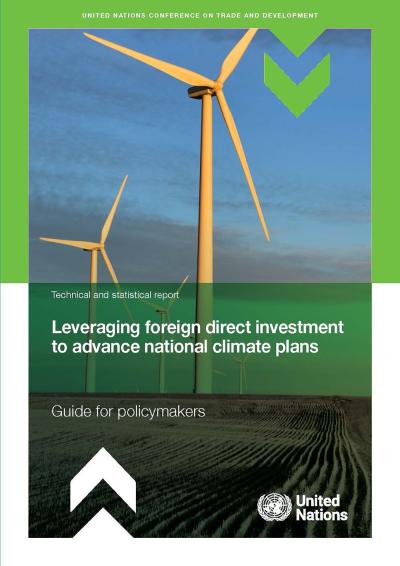
Achieving the goals of the Paris Agreement (2015) requires substantial financing to develop and implement the investment projects necessary to deliver nationally determined contributions (NDCs).
The successful implementation of NDCs could not only limit the hazardous effects of climate change but also lift hundreds of millions of people out of poverty and increase global gross domestic product (GDP) by up to 13 per cent by 2100.
In addition to the need to pursue decarbonization and contribute to global climate change mitigation, developing countries face the imperative of simultaneously tackling multiple challenges, including addressing urgent development needs, such as energy access, job creation and economic diversification, and strengthening resilience to the growing impact of climate change, within the broader context of the triple planetary crisis-climate change, biodiversity loss and pollution.
Foreign direct investment (FDI) can play an important role in addressing such challenges by bringing long-term capital and technological expertise and contributing to regional and global value chain integration.
When strategically directed, it can also help expand infrastructure and strengthen productive capacities in climate-strategic sectors, such as renewable energy, sustainable transport, agriculture, tourism and the blue economy. Yet, current FDI flows remain insufficient and unevenly distributed, with investment needs in the renewable energy sector alone amounting to approximately $2.2 trillion annually, more than half of the total SDG investment gap.
This guide complements UNCTAD's guide on trade policies to advance climate plans.
"Zero drafts" of both documents were introduced for consultation with stakeholders in November 2024 at the twenty-ninth session of the Conference of the Parties to the United Nations Framework Convention on Climate Change (UNFCCC), held in Baku, Azerbaijan. By focusing specifically on FDI policies to support NDC implementation, this guide also complements other initiatives, including the Climate Investment Planning and Mobilization Framework of the NDC Partnership and the Green Climate Fund.
As a living document, the guide reflects current country experiences and good practices and will be updated as new lessons and approaches emerge.
Drawing on UNCTAD's expertise in international and national investment policy and promotion, this guide offers policymakers a practical roadmap to:
- Integrate investment and FDI needs into NDCs (Part I).
- Align national policy frameworks with climate objectives (Part II).
- Strengthen promotion efforts to attract bankable climate-aligned projects (Part III).
UNCTAD stands ready to assist countries in implementing the guide.
About nationally determined contributions
Article 4 of the Paris Agreement requires each Party to prepare, communicate, and maintain successive nationally determined contributions (NDCs) that it intends to achieve, and to pursue domestic mitigation measures to meet these objectives.
Each successive NDC would represent a progression and reflect the Party's highest possible ambition, taking into account common but differentiated responsibilities and respective capabilities in light of national circumstances. Developed country Parties are expected to take the lead through economy-wide emission reduction targets, while developing country Parties are encouraged to enhance their efforts with support for finance, technology, and capacity-building.
All Parties should communicate updated NDCs every five years, informed by the global stock-take.
